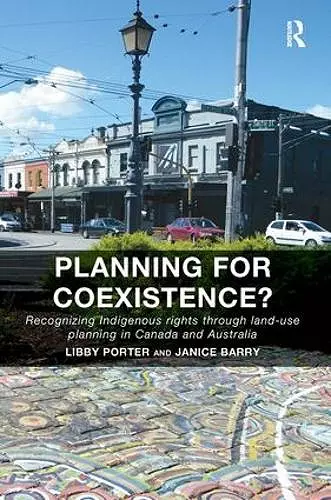Planning for Coexistence?
Recognizing Indigenous rights through land-use planning in Canada and Australia
Libby Porter author Janice Barry author
Format:Paperback
Publisher:Taylor & Francis Ltd
Published:12th Feb '18
Currently unavailable, and unfortunately no date known when it will be back
This paperback is available in another edition too:
- Hardback£150.00(9781409470779)

Planning is becoming one of the key battlegrounds for Indigenous people to negotiate meaningful articulation of their sovereign territorial and political rights, reigniting the essential tension that lies at the heart of Indigenous-settler relations. But what actually happens in the planning contact zone - when Indigenous demands for recognition of coexisting political authority over territory intersect with environmental and urban land-use planning systems in settler-colonial states? This book answers that question through a critical examination of planning contact zones in two settler-colonial states: Victoria, Australia and British Columbia, Canada. Comparing the experiences of four Indigenous communities who are challenging and renegotiating land-use planning in these places, the book breaks new ground in our understanding of contemporary Indigenous land justice politics. It is the first study to grapple with what it means for planning to engage with Indigenous peoples in major cities, and the first of its kind to compare the underlying conditions that produce very different outcomes in urban and non-urban planning contexts. In doing so, the book exposes the costs and limits of the liberal mode of recognition as it comes to be articulated through planning, challenging the received wisdom that participation and consultation can solve conflicts of sovereignty. This book lays the theoretical, methodological and practical groundwork for imagining what planning for coexistence might look like: a relational, decolonizing planning praxis where self-determining Indigenous peoples invite settler-colonial states to their planning table on their terms.
In this confronting and important book, Libby Porter and Janice Barry challenge the compliance of planning institutions and practices in the ongoing dispossession of Indigenous peoples. Nothing less than theoretical and practical deconstruction of property rights structures and of planning itself are necessary in order to cultivate intercultural capacities for respectful coexistence. Powerful work, eloquently written, a pleasure to read.
Jean Hillier, RMIT University, Australia
When envisioning the future, planning has the ability to reproduce colonial power or take a decolonizing path where Indigenous peoples engage in planning on their own terms. Libby Porter and Janice Barry develop a compelling argument for the latter transformative planning praxis. In this book, non-Indigenous practitioners are challenged to develop their intercultural capacity as part of a reshaping of planning.
Michelle Thompson-Fawcett, University of Otago, New Zealand
ISBN: 9781138490406
Dimensions: unknown
Weight: 362g
232 pages